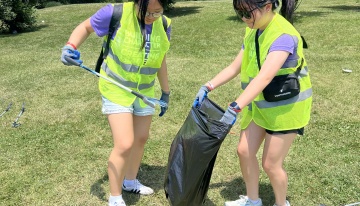Why Summer Camps Should Let Kids Lead
When the YMCA developed new tools and training resources for its more than 747,000 day camps nationwide in 2015, “camper choice” was among the most popular elements.

Perhaps this is no surprise as child development research suggests giving kids a voice and choice helps them achieve their full potential. However, this seemingly simple concept of allowing youth to choose activities throughout the day initially caused concern amongst camp staff: “Giving campers choices may lead to chaos!”
Yet the research points to successful outcomes. And indeed, the 87% of YMCA camp staff who implemented camper choice last summer reported overwhelmingly positive results: campers were excited and engaged; they connected with their peers in new ways based on similar interests, and they discovered their passions.
Allowing campers to contribute ideas, make choices and share in program leadership roles helps kids build the leadership, problem-solving and decision-making skills they’ll need in the future. Despite the positive evidence, there are four common barriers to supporting youth choices in camp programs:
1. A Packed Program Schedule
Most camp staff start each day with an already full program schedule and feel giving campers choices may derail a busy day. However, staff can dedicate a block of time to camper choice and offer activity stations for youth to visit. By doing this, camps are offering the same activities, but with an added layer of youth choice. Easy!
2. Working with Young Children
As children grow from babies into toddlers, encouraging them to make their own choices can be unfamiliar and uncomfortable. Some staff may see young children as not capable of making their own decisions and default to doing this on their behalf or deferring to older children to decide for the younger ones. However, an easy way to address this fear is to give young children very simple and limited choices such as “What color circle would you like to sit on: blue or green?”
3. Allowing Youth to Lead
Turning over a leadership role to young campers may feel unnatural at first. However, in some instances, it’s important to allow youth to not only make decisions but also to lead an activity or event. As staff, you can set the parameters. For example, staff might say that snacks need to be healthy or the game can only last 30 minutes. Next, seek youth input on how the activity should run. Allow them to lead the activity with staff supervision. Finally, incorporate reflection time so that youth can learn from their decisions.
4. Fear of Losing Control
In any camper choice experience, staff may feel like they are relinquishing control—an uncomfortable and scary feeling for natural-born leaders like camp staff. Yet giving campers options and respecting their voices fosters a safe environment where children can feel comfortable sharing their thoughts and ideas and even making mistakes. Camp staff who surrendered to this fear and empowered the youth in their care report tremendous impact!




